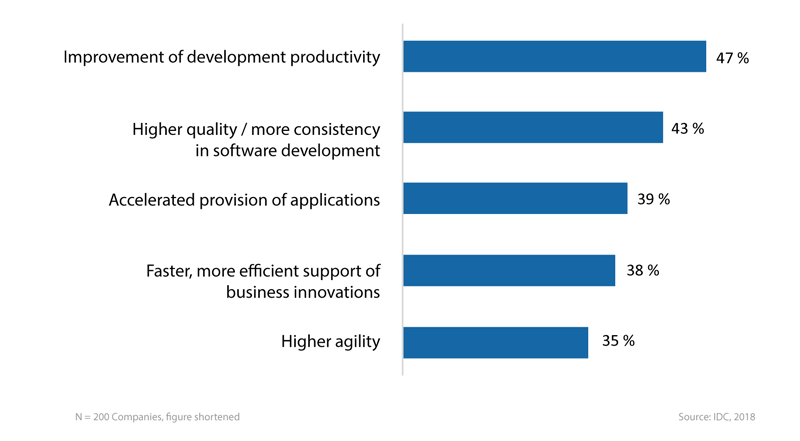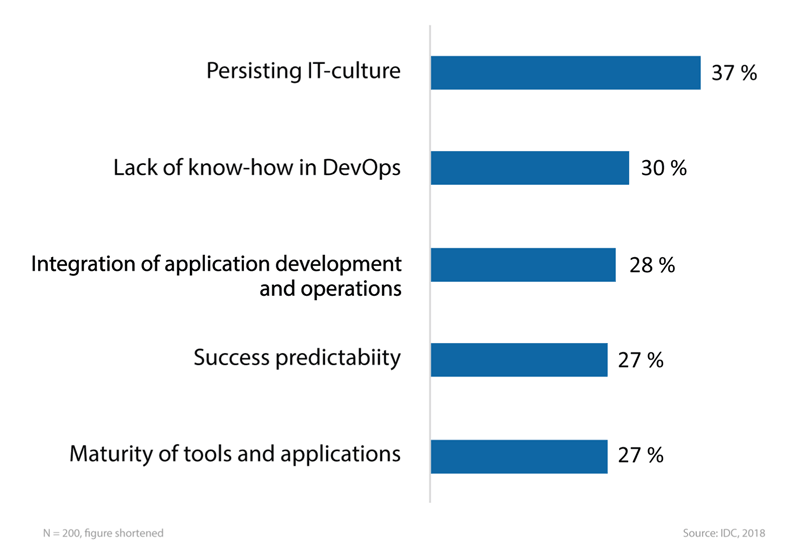
Where is DevOps going?
Recently, a study by International Data Corporation (IDC) entitled »DevOps 2.0 in Germany 2018« has been published. We supported the survey of IT decision makers from 200 organizations last October as a project partner and are now happy to provide an insight into the results offering an executive brief (only in German) for download. We also want to share our own thoughts and interpretations here.
Current situation in software development and IT departments
As can be seen from the study results, many companies have recognized that the digital transformation can only be insufficiently supported with the traditional methods of software creation and delivery. Nonetheless, many specialist departments are dominated by classic, highly structured and closed procedures, which slow down the agility, speed and flexibility of software delivery. In exchange with many of our customers we see a similar picture. Although the will is there to drive the DevOps approach in-house, the topic is still in its infancy in Germany. Many are insecure because there is no »best practice transformation model«, which brings companies safely on this path. Since recommendations for methodological approaches, technologies and tools should be very individual anyway, it is questionable if such a universal model will ever exist. The need for support through individual training and consulting services in the DevOps area is therefore also growing noticeably for us.
Benefits of DevOps are recognized
Creating applications and running them in stable systems is an essential part of the value chain in many companies. In this context, some interviewed company representatives already have a clear idea of what they expect from DevOps. The top 3 motivators in DevOps adoption were improved developer productivity, increased software quality, and reduced provisioning time (see figure 1).
Main motivators for using DevOps in enterprises
However, all these goals can only be implemented if development (Dev) and administration (ops) work together as smoothly as possible in terms of the DevOps concept. The basis for this, according to the study, is to understand the requirements and working methods of the other IT area and to support each other.
Specifically, we at Cloudogu also see four additional measures as a prerequisite for being able to use DevOps:
- a structured knowledge structure
- a corporate culture that promotes agile methods, permanent learning and the delegation of responsibility, as well as
- the right tools and
- an optimized infrastructure.
As companies embark on initiatives that equally address all of these issues, they will succeed in increasing the performance of the IT and IT organization.
Unleash the DevOps potential
At Cloudogu, we are delighted that DevOps is perceived positively in the German market and is enjoying a growing status. However, there is still much to be done in the majority of companies to understand all aspects of DevOps and unleash its potential. Here we see ourselves as companions of companies that want to seize their opportunities and go the way of cultural change. We help to put the advice mentioned in the executive brief into practice. Based on in-house experience with large clients, we help with the correct placement of DevOps processes in the IT modernization projects, the persuasion of their teams and automation. We also have solutions for using tools in an integrated platform and dealing with security issues. Drawing on our certified team of trainers, experienced consultants and a great product, we find answers to questions about DevOps that bother many IT departments. We accompany companies individually to establish new structures and cooperation models and thereby become DevOps ready in their own speed.
IT areas are slowly starting to go the DevOps path
The study confirms our experience in exchange with customers that the topic of DevOps has been discussed in German companies for some years as a solution approach, although only a few organizations have made sound experience. Only about a quarter of respondents said they used DevOps methods and concepts for more than 12 months. Another 20% have less than 12 months of experience and 55% are just getting into the subject.
However, change management to DevOps is an evolution rather than a revolution for many IT sectors. According to the study, developers, testers and administrators should step-by-step integrate their complex set of technologies into the SDLC as a holistic approach: from requirements to source code management, build, testing, delivery and orchestration, deployment, operations and security. According to IDC, companies can unleash the potential for DevOps especially if state-of-the-art software tools are used with modern development and deployment methods and run in secure environments.
Obstacles and solutions in DevOps implementation
Another interesting finding is that more than two-thirds of companies find that sticking to old habits, problems with integrating application development and IT operations, and lack of know-how are the biggest obstacles to introducing DevOps. In addition, over a quarter of respondents saw the maturity of tools and applications as an obstacle to introducing DevOps.
Top 5 Obstacles for DevOps in Germany
»Our three portfolio areas – Training, DevOps Consulting and our product (Cloudogu EcoSystem) – offer the opportunity, individually or as a combination, to overcome these obstacles and hurdles in order to fully exploit the benefits of DevOps,« said our Managing Director Thomas Grosser. »We can perfectly support companies that are in the transformation phase.« In addition to accurate consulting on issues around DevOps, development department’s benefit through our operating platform, with the individual and vendor-independent toolchains can be put together to prevent vendor lock-in. Due to the modular architecture of the EcoSystem existing processes and established tools can be expanded or exchanged with new development tools at their own speed. Our offer is completed by trainings in the fields of containers, orchestration, agile and Kubernetes.
DevOps recommendations
The increasing digitalization means that today almost every company is a software manufacturer. When choosing the right solution, companies should have confidence in the performance of the service provider or solution. As a consulting firm for DevOps initiatives, our approach involves first taking a comprehensive history of the IT organization before offering services or products. A 360-degree view of the existing Dev and Ops processes helps to jointly find the right approach and the right priorities for an individual DevOps initiative. Ultimately, we try to get IT organizations right where they are in their DevOps Journey. Further establishing DevOps in Germany is our central goal.
We look forward to get in touch with you on this subject via email.





